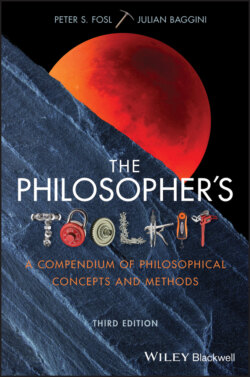Читать книгу The Philosopher's Toolkit - Julian Baggini, Julian Baggini - Страница 39
Importance of validity
ОглавлениеThis may lead you to wonder why, then, the concept of validity has any importance. After all, valid arguments can be absurd in their content and false in their conclusions – as in our cheese and cats example. Surely it is soundness that matters?
Okay, but keep in mind that validity is a required component of soundness, so there can be no sound arguments without valid ones. Working out whether or not the claims you make in your premises are true, while important, is also not enough to ensure that you draw true conclusions. People make this mistake all the time. They forget that one can begin with a set of entirely true beliefs but reason so poorly as to end up with entirely false conclusions. It can be crucial to remember that starting with truth doesn’t guarantee ending up with it.
Furthermore, for the sake of launching criticisms, it is important to grasp that understanding validity gives you an additional tool for evaluating another’s position. In criticising a specimen of reasoning, you can either:
1 attack the truth of the premises from which he or she reasons,
2 or show that his or her argument is invalid, regardless of whether or not the premises deployed are true.
Validity is, simply put, a crucial ingredient in arguing, criticising, and thinking well, even if not the only ingredient. It’s an utterly indispensable philosophical tool. Master it.
